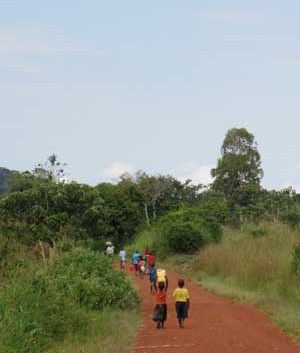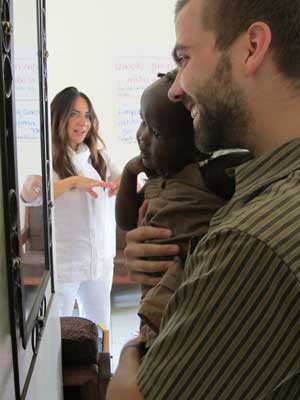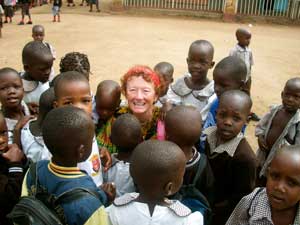
I’d been running for a little over an hour. The sounds from under my feet reflected the moisture left by the most recent rain. I ran along a muddy trail that followed an abandoned railroad track through the lush northern Ugandan bush. A cloudy sky drew out the contrast between the red earth trail and the vibrant, green grasses, hills, and trees.
After an hour of thinking, “I’ll just see what’s around this bend,” my quest to satisfy my curiosity brought me to a village. This village had clearly been built as an internally-displaced-persons camp, and it served as another reminder of the recently ended war and the reason for our research project.
The runner was doctoral student Chris Mehus, one of three members of a new “internationalization triangle” in Uganda. The other two are associate professor Liz Wieling in the Department of Family Social Science and recent doctoral grad Jennifer Simmelink McCleary from the School of Social Work. Internationalization triangles are collaborations among three members of the College of Education and Human Development (CEHD) community. At least one must be a student, and at least two disciplines must be represented.
Wieling, Mehus, and Simmelink McCleary received a grant to support research in Uganda building on Wieling’s years of experience there.
Uganda is a land-locked country on the equator, part of the Nile basin. Its area is a little bigger than Minnesota while its population is more than six times as large and growing rapidly.
It is a nation recovering from decades of war that ended about five years ago. The dictatorship of Idi Amin in the 1970s was followed by the terror of the Lord’s Resistance Army war against the government led by Joseph Kony. For more than 20 years, the Acholi and Lango people of northern Uganda experienced horrendous violence and poverty. The trauma experienced by youth was extreme: UNICEF reported in 2005 that more than 32,000 had been abducted by the LRA, with boys forced to kill friends, family, and others, and girls forced into sexual slavery. Most families in the region—an estimated 2 million people—were moved to internally-displaced-person camps like the one Mehus came upon, their way of life completely disrupted.
Wieling first came to Uganda in 2010 during a sabbatical year. She had been working closely with international colleagues who developed an evidence-based treatment for post-traumatic stress disorder called Narrative Exposure Therapy, used around the world with populations affected by war and organized violence. They formed vivo (“victims’ voice”), working by then in Uganda.
Wieling’s work is focused on developing interventions for families in war-affected communities. In the area around Gulu, she has interviewed groups of mothers and fathers in the rural areas about family values, parenting practices, and areas of need in preparation for adapting and testing the parenting intervention. Despite advances in treating victims of traumatic stress, few studies and no evidence-based treatments exist to treat parents, couples, and families.
“There are many non-governmental organizations working in Uganda,” says Wieling, “but none are doing this kind of work.”

Wieling and Mehus co-facilitated a nine-session pilot of the parenting intervention with 14 mothers. The internationalization triangle grant will allow them to return to Gulu this year to further develop the multi-component trauma intervention in preparation for a larger research trial. Simmelink McCleary (joining Tulane University as an assistant professor this fall) brings cross-cultural expertise in substance abuse and domestic violence and will conduct qualitative interviews around the community.
During the pilot interventions he co-facilitated, Mehus keenly observed the change process for the mothers.
“One morning, a few weeks into the intervention, a mother poignantly told us that she now sees love in her family she did not know was possible,” he says. “More than one mother said family members were noticing and praising them for the changes they had already made in themselves and their families. They were moved by the loving responses of their family members, and we were moved by their joy in telling the stories.”
It is preliminary observations like this that give hope for interventions that can help families to keep the violence inflicted upon themselves from passing to the next generation.
The team is working now to publish the results of the pilot study and apply for a grant to test a full version of the parenting intervention and extend it to fathers.
Guided to a global view
CEHD adopted the internationalization triangles concept two years ago to increase opportunities for student international experiences while supporting faculty and staff initiatives and creating a global culture in the college as a whole.
Uganda was also the site of the first internationalization triangle’s work, in 2012. That triangle built on the long-standing involvement of Institute of Child Development professor Nicki Crick, a pioneering researcher on relational aggression.
Crick first brought doctoral researcher Kathryn Hecht with her to Uganda in 2011. Hecht, specializing in child clinical psychology, had been drawn to the University because of ICD’s leading work to understand how children respond to and recover from trauma, and cultural factors that influence recovery. Hecht helped Crick to conduct exploratory research with the broad aim of looking at psychosocial and relational factors affecting war-affected adolescents. The team collaborated with a private K–12 school in Lira, a region in northern Uganda about two hours southeast of Gulu.

In 2012, the internationalization triangle grant allowed Crick to bring Hecht back to Lira, as well as Ross Thompson, an instructor in the Shirley G. Moore Laboratory School. Thompson was able to witness firsthand the struggles of early childhood educators in Uganda as they face crushing poverty, an outdated colonial-era curriculum, and widespread apathy about the necessity of early education. In a series of workshops, he shared modern teaching methods and theories designed to empower teachers to bring out the best in their students.
Crick and Hecht collected more data and transitioned the exploratory, cross-sectional data collected the previous year into a longitudinal data set—critical to the field, since development is a process of change over time. They also taught a study abroad course with ICD administrator Peter Ralston, bringing 16 undergraduates to the Lira school to conduct independently designed small-group research studies.
Shortly after returning home in 2012, Crick was diagnosed with an aggressive form of cancer that took her life in the fall. The loss of such a vibrant visionary was profound. At a memorial symposium about Crick’s work at the Society for Research in Child Development, Hecht presented on the team’s work in Uganda.
“Nicki’s pioneering work in peer relationships and aggression meant that, in many ways, she guided researchers through the field of child development,” says Hecht. “In those final years we were witnessing a shift as Nicki’s passion guided us once again, toward a more global and inclusive view of the field of child development.”
This year, Hecht returned to Uganda for a third summer to continue the research she began with Crick. She led a group—a research assistant, two undergrad volunteers, and three community members, including a clinical psychologist and a preschool teacher. Her dissertation will look at the impact of relational factors in the adjustment of war-affected youth in Uganda, using the data set spanning 2011–13. A special-topics course that Hecht is teaching this fall, “Development Across Cultures,” immediately filled to capacity.
Meanwhile, Thompson, Ralston, and Lira Integrated School are sharing knowledge that builds on Crick’s work and her insight that cross-cultural competencies and communication are essential to success in the emerging global environment.
Chris Mehus came to a similar conclusion this summer when he was welcomed in the village he came upon during his daily run.
The first hut I came to was larger than the typical huts but built in the same fashion [with] grass roof and mud-smeared walls. As I stood listening to the drums and rattles that reverberated from inside, a woman passing on a bike told me it was a church and asked if I wanted to go in. I spent the next hour clapping and swaying next to a woman beating on a goat-skin drum.
I gained a great deal of research experience during my nine weeks in Uganda, but experiences like this were some of the most valuable.
Read more about CEHD global initiatives.
Story by Gayla Marty